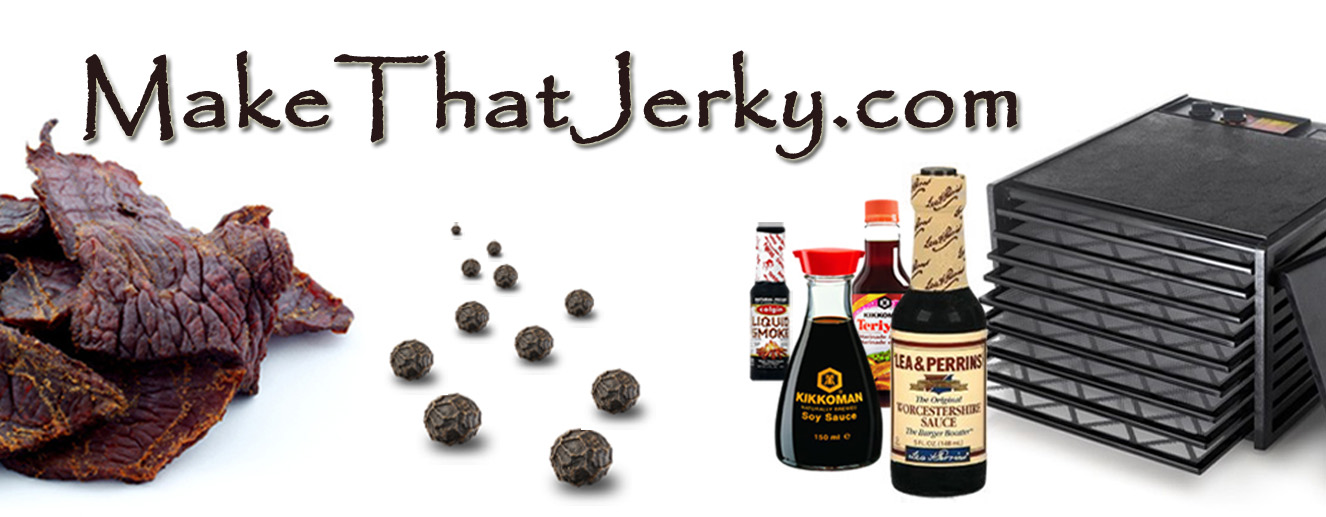Homemade Beef Jerky Methods
Here's how to make homemade beef jerky following 4 simple yet critical steps. The four steps listed below each have their own place in the process and all come together to make a bag of gold worth dieing for! Well maybe not dieing for, but darn close ..
Beef Jerky Meat Selection
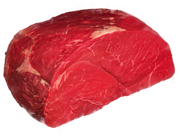 The meat you decide to use for your homemade beef jerky should always be the leanest you can find. The reason being is that fat makes it harder to dehydrate and it can make the meat rancid. I'm not necessarily saying that it can't have some fat on it, but it's good practice to cut as much as possible off before starting.
The meat you decide to use for your homemade beef jerky should always be the leanest you can find. The reason being is that fat makes it harder to dehydrate and it can make the meat rancid. I'm not necessarily saying that it can't have some fat on it, but it's good practice to cut as much as possible off before starting.
There are 4 good cuts of meat that I like to use when making a batch of homemade beef jerky. Rump Roast, Beef Top Round Steak, Bottom Round Steak, and flank steak are good choices.
I personally like a Beef Top Round because it's usually the perfect size for making medium sized strips, but it's really up to personal preference. I say try them all and see what you like best.
You can also use other cuts of beef but if you do, just make sure there is not to much marbleization and again, be sure to trim all the fat off.
Beef Jerky Meat Preparation
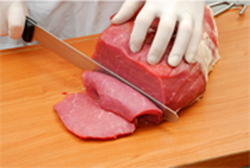 Preparing your jerky meat first starts with freezing it which makes it easier to slice nice and thin like you want it. You don't want to freeze it to much though so pull it out once it starts to get some ice crystals on it and becomes slightly firm to the touch.
Preparing your jerky meat first starts with freezing it which makes it easier to slice nice and thin like you want it. You don't want to freeze it to much though so pull it out once it starts to get some ice crystals on it and becomes slightly firm to the touch.
I always prefer to cut my meat about 1/4" thick because it seem to be just perfect in the end. What I mean is that it's not to dry or moist, it's a good in between texture. You can cut yours a little thinner if you choose to but no thinner than 1/8" is a good rule of thumb.
Always cut your jerky meat against the grain. What I mean by this is that if you look at a piece of beef, you will notice the strands of meat all run together in the same direction. This is called the grain of the meat. The reason we cut against the grain of the meat is to make it much easier to chew. If you cut it with the grain, it makes it really hard on your teeth!!
Marinating Your Beef Jerky
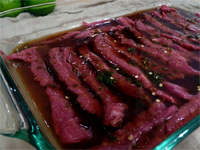 The most important part of making a good homemade beef jerky is making the marinade! This is where the true flavor of the final product comes into play.
The most important part of making a good homemade beef jerky is making the marinade! This is where the true flavor of the final product comes into play.
Some of the best beef jerky recipes around are listed right here on this very site for your convenience! Take a good look at them and decide which ones excite your tongue the most.
Once you have chosen a recipe and followed the instructions for preparation, you can start to marinade the meat. Begin with a cake pan or casserole dish. Lay your beef jerky strips on the bottom in even rows, you can overlap them if necessary. Now pour the marinade over the meat making sure that the meat is fully emersed in the marinade and finally cover the container with foil. This can also be done with gallon size ziploc bags.
Marinating in general should be done overnight for about 12-24 hours depending on the recipe.
Dehydrating Your Homemade Beef Jerky
Alright guys, this is the fourth and final step of making your top notch homemade beef jerky and it can be done in many ways.
Please keep in mind that there is no set time for how long this part will take, The reason for this is because there's always a variation in the amount of heat, thickness of the meat, and moisture content of the meat. The dehydration process generally takes between 5-7 hours.
Using Your Home Oven
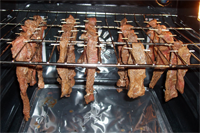 I first started off using my oven to make jerky many years ago and honestly, it worked great!
I first started off using my oven to make jerky many years ago and honestly, it worked great!
First you will need to grab some shish kabob skewers from the store. You can use metal or bamboo but if you use bamboo, be sure to soak them in hot water for about 30 min.
Remove your jerky meat from the marinade and put your strips on the shish kabob skewers. Set the skewers of meat directly on your oven racks. Set your oven to about 160 Degrees and let the meat dehydrate for about 5 hours or until done. Make sure you keep an eye on it. It's a good idea to check it about every 30 minutes or so after the first two hours.
One thing I learned is to leave the door cracked open the whole time. This allows the evaporated moisture to leave the oven easier and also helps regulate the heat to prevent it from getting to hot.
The jerky is done when you no longer notice any pink in the middle. You will also notice a "jerky" texture to it and it will be slightly crispy. A good way to test your jerky is to bend it in half. When it bends in half and cracks without breaking, it is ready to pull out.
Beef Jerky Dehydrators
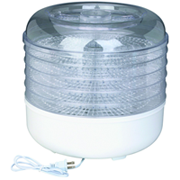 Jerky dehydrators also work great and depending on the size, can allow you to make more jerky at one time than an oven can. They are also simple to use and easy to clean.
Jerky dehydrators also work great and depending on the size, can allow you to make more jerky at one time than an oven can. They are also simple to use and easy to clean.
The process goes about the same for dehydrators. Remove your jerky meat from your marinade and lay it evenly on the trays of the dehydrator. Spray the trays lightly with cooking pan spray if they are made of metal. Then turn the unit on at 160 degrees and monitor for 5-7 hrs until it's done.
You can use other sources for dehydration such as smokers and grills but honestly the two methods mentioned above will give you the best shot at being successful your first time.
Air Filter Dehydration
A good cheap alternative to an oven or dehydrator is the "air filter and box fan" technique featured by Alton Brown. This technique consists of 3-4 new air filters and a box fan.
First remove you jerky meat from your marinade and dry it with some paper towels by lightly patting it. Set down your first air filter and evenly lay your marinated strips of jerky meat on top of it in rows.
Now lay your second air filter over the top of your jerky and continue laying your jerky meat on top of the second filter. The last step is to lay your third filter on top of your second filter. You can also use a total of four filters if you don't have enough room for all of your meat.
Lastly lay your box fan down flat with the front side of the fan pointing up. Lay your bundles of filters/meat strips on top of it and secure it to the box fan with 2-4 bungee straps.
Stand the fan up right and turn the fan on . The fan should at this point be blowing the air through the filters and the dehydration process will begin.
Dehydrating your jerky with this method will generally take around 8-12 hours. Be sure to check the jerky every 30-60 minutes after you enter the fourth hour to ensure that you don't over dehydrate it.
The process of making homemade beef jerky seems quite easy and it is, but perfection comes when you master your recipes and dehydration process so pick one of these tasty beef jerky recipes and get practicing!
Related Articles
How to Make Beef Jerky >Homemade Beef Jerky Methods

